A quick note: I was on jury duty last week, and was unable to do the Rewatch this past Thursday because I was doing my civic duty. But the trial’s over now, so we’re back in the saddle.
“The High Ground”
Written by Melinda M. Snodgrass
Directed by Gabrielle Beaumont
Season 3, Episode 12
Production episode 40273-160
Original air date: January 29, 1990
Stardate: 435210.7
Captain’s Log: Rutia IV is a trading partner of the Federation that has been having some civil unrest—Ansata separatists have been agitating for autonomy for their people on the western continent. Terrorist activity by the Ansata has been on the rise.
The Enterprise arrives to deliver medical supplies, and as Data, Worf, and Crusher are about to go to a meeting, a bomb goes off, wounding several, whom Crusher insists on treating. As she works, Worf, an Ansata cop, and Data all go over to her to point out the dangers of sticking around a bomb site, to no avail, and Picard is also unable to convince her to get the hell out of there. Picard mulls over the possibility of beaming her out against her will, to which Riker sagely replies, “I don’t want to be in the transporter room to greet her.”
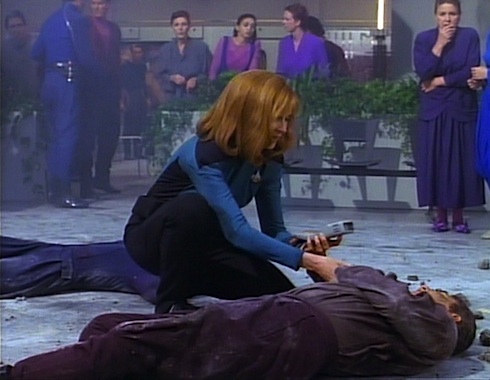
After Picard reluctantly tells the away team to hold their position until Rutian medics can arrive to take over from Crusher, an Ansata appears out of nowhere, shoots a Rutian cop, grabs Crusher, and disappears with her. The method used left no trace, and they can’t find her combadge.
Meanwhile, Crusher refuses to speak to her captor, a fairly charming man named Kyril Finn. She eventually, reluctantly, agrees to eat some food, and finally talks to Finn. He accuses the Federation of taking sides by giving the Rutians medical supplies. Crusher doesn’t understand, saying that people were hurt. Finn coldly says, “I know—I hurt them.” Finn then leads Crusher to a ward of very sick people and hands her Federation medical supplies stolen from the dispensary.
Picard and Riker meet with Alexana Devos, the director of Rutian security. They have no idea how the Ansata teleportation works, but they’ve taken devices off dead terrorists. Picard takes one back to the ship and gives it to Data, La Forge, and Wes to study. Riker stays with Devos, who has developed a tremendous animus toward the Ansata, thanks to everything she’s seen, not the least of which was a bomb that killed sixty schoolchildren.
Crusher’s patients are dying, and it’s due to the use of an inverter that allows them to travel via dimensional shift. Data, La Forge, and Wes are able to reverse engineer the device they brought back to figure out how the inverter works. Data points out that using this dimensional shift would be an irrational act; Picard reminds him that terrorists are often irrational. And using the inverter may explain why the Ansata need the services of a doctor
Finn and Crusher get into a heated argument about the morality of what he’s doing—started, amusingly, by her noticing him sketching on a pad. Finn likens himself to George Washington, countering Crusher’s retort that he was a military general rather than a terrorist by saying that he’s only called that because he won.
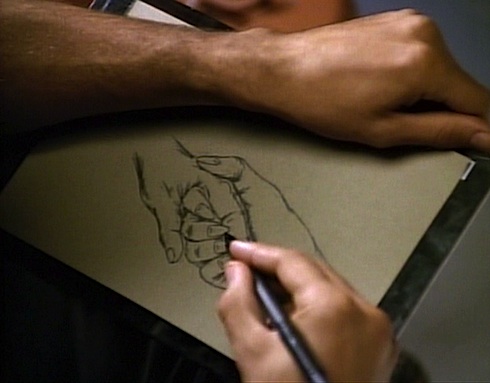
Devos brings in pretty much anyone connected with the Ansata for questioning in an attempt to find Crusher. Riker gets fed up with the I-know-nothing treatment from everyone and finally tells one person—a waiter from the café where the bombing at the beginning of the episode happened, and who was looking very suspiciously at Crusher before she was taken—to take a message to the Ansata that the Federation is willing to negotiate.
The waiter goes back to the Ansata camp and tells Finn that the Federation is collaborating with the Rutians to engineer massive arrests, an understandable if completely wrong interpretation of Riker’s words. Finn’s response is to attack the ship. Several Ansata teleport onto the ship using the inverter, shooting one of La Forge’s engineers (and almost shooting three others including La Forge), and placing an explosive device on the engine core. La Forge is able to get rid of the explosive, but then two more Ansata—including Finn—show up on the bridge. Picard hauls off and belts Finn (which, I gotta say, is fun to watch) and Worf gets shot while simultaneously shooting his attacker. The two Ansata teleport off, Finn with Picard, thus giving them another hostage.
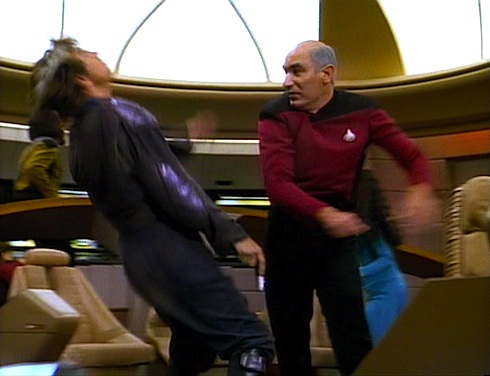
Finn teleports to the bridge and gives Troi their demands: they want the Federation to embargo Rutia and serve as mediators for negotiations between the Rutians and the Ansata. But that last dimensional shift finally gives Wes and Data the ability to track them down, which thrills the heck out of Devos. Riker and Worf join Devos and a team of Ansata cops to the caverns. They take out the generator, plunging the caverns into darkness.
Finn goes to shoot Picard, but before he can pull the trigger, Devos shoots him in the back. Another Ansata—a young boy—holds a gun on Riker and Devos. Crusher convinces him to put the gun down, and then he’s taken away. Devos sees the boy as Finn’s replacement, but Riker expresses hope that one boy putting his gun down might be the right beginning for peace.
Back on the ship the Crusher family is reunited and the Enterprise runs away very fast from Rutia.
Can’t We Just Reverse the Polarity?: The inverter the Ansata uses warps their DNA, causing their cellular structure to break down. But standard sensors can’t pick up the shift or the people’s movements with it, so it’s an effective use of covert transport once you get the whole past it’ll-kill-you thing .
Thank You, Counselor Obvious: Troi tells Picard that Wes needs his strength—and then Picard and Wes have basically no scenes together—and then is the only person on the ship who doesn’t understand why La Forge told the transporter room to lock onto his own signal to beam the explosive off (he put his combadge on the explosive so the transporter could get a signal).
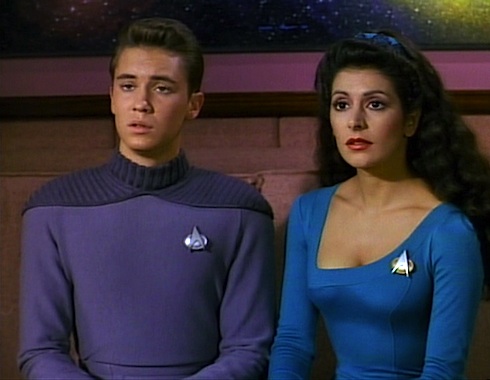
There is No Honor in Being Pummeled: Worf opines from that Crusher wasn’t a random target. Riker asks why when the Federation isn’t involved, and Worf points out that they are involved now. He later gets shot in failing to protect Picard, and feels remorse, and so goes down on the away team and helps stop the terrorists.
The Boy!?: Wes requests to go down with Picard and Riker to meet with Devos, but Picard instead assigns him to track the dimensional shifts. He’s the one who figures out how to track the terrorists’ movements, though Wes himself says he was just part of the team (which included La Forge and Data, who did a lot of the work, too).
No Sex, Please, We’re Starfleet: Picard and Crusher fall into their usual banter when Picard is captured. And Crusher starts to tell Picard something very important, but then is interrupted. This will happen again in “Remember Me,” and quickly become a running joke among Star Trek fans.
Finn also flirts with Crusher while scaring the piss out of her, which is just creepy.
Oh, and Riker is put together with a pretty woman and totally doesn’t flirt with her. Which would’ve been even creepier, given the circumstances, so that’s a good thing, but it’s worth mentioning for its oddness.
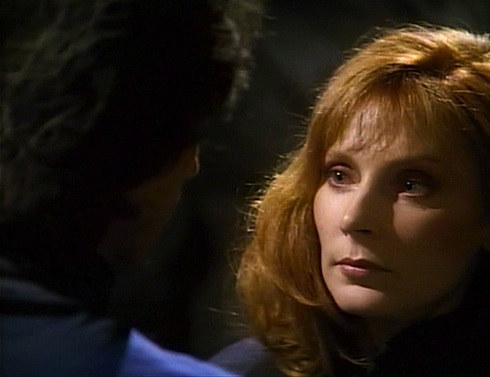
I believe I said that. “Captain, there’s a lot to admire about the Federation, but there’s a hint of moral cowardice in your dealings with nonaligned planets. You do business with a government that’s crushing us, and then you say you aren’t involved? You’re very much involved, you just don’t want to get dirty.”
Finn, pointing out his issues with the Prime Directive.
Welcome Aboard: Richard Cox does a decent job as Finn—he’s kinda slimy, but the part calls for that. In fact, he’s the same kind of slimy as Devinoni Ral, but here it actually works.
But the standout here is Canadian actor Kerrie Keane, who is superb as Devos. She blew me away in the role, creating a three-dimensional character from what could’ve been a fairly cliché role.
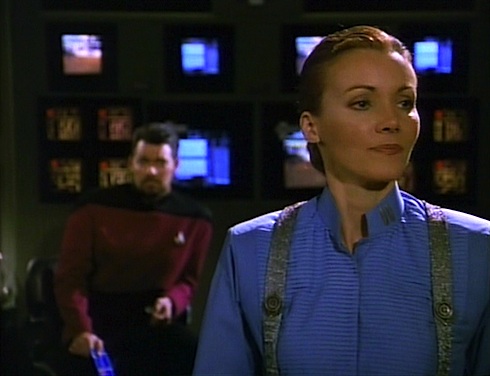
Trivial Matters: At one point, Data makes a reference to the Irish Reunification of 2024, and because of that, the BBC refused to air the episode. It didn’t air on the U.K. government’s station until 2007, though it did air on satellite and cable (sometimes with that reference cut), and was released unedited on DVD in the U.K.
Make it So: “This is no way to live.” It’s interesting—this is the first of several times that the 24th-century spinoffs of Star Trek would deal with terrorism, to the point where main characters in both Deep Space Nine and Voyager (Kira, Chakotay, Torres) have histories as terrorists.
This particular episode is a little weird to watch after living through September 11th, Guantanamo Bay, the “war on terror,” the TSA and its intrusive policies, and the PATRIOT Act. The way the Rutians live reminded me a bit of what it was like living in New York in 2002.
The writing staff is less than happy with the episode, which stunned me when I read that, because I actually thought the episode was an effective colloquy on terrorism and what it does to people. Devos is probably the best example—someone who’s stuck in the middle of it and has come to hate the terrorists not because of her views, but because of what she’s seen.
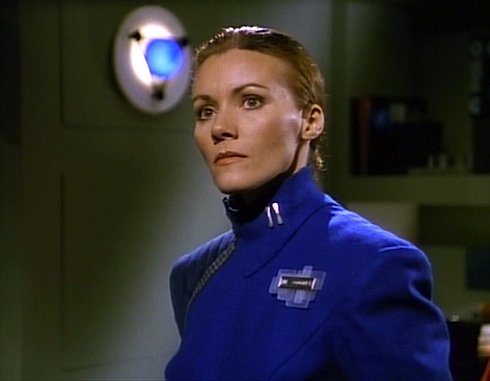
And yet Finn does have a point, at least occasionally—he’s fighting for freedom, which really is what the colonists were fighting for in the late 18th century, even though the episode is a far stronger analogue for the Troubles in Ireland.
But it works for me. It’s the first episode of Trek that was both written and directed by women, and both Crusher and Devos in particular shine. It’s one of Crusher’s best episodes, and Devos is a great guest character.
Warp factor rating: 7
Keith R.A. DeCandido lives in New York and was there on September 11th. It kinda sucked. His thoughts on the subject are archived at his web site, which also has links to buy his incredibly brilliant books, not to mention his Facebook page, his Twitter feed, and his blog. Check it out.










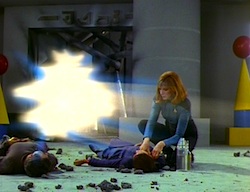
Picard has a line in this episode which is fairly accurate- “History has shown us strength may be useless when faced with terrorism.”
I agree I was shocked that the writers didn’t like this episode- though I think in RDM’s case it was that he couldn’t quite do the shades of gray that was later pulled off in DS9/Voyager with the Maquis and especially in BSG. The difference was that this was a bottle show and that those were all major plot points.
On a completely unrelated note, I’m glad that Data introduced examples of future history… in season 1 and 2 there were a lot of comparisons by 24th century explorers from any number of ethnicities/planets that all seem to make reference to American history. The Irish Unification and Kenzie rebellion are nice touches that show that there was an actualy history between 1985 and the time that Captain Kirk takes command of NCC-1701.
Where did the writers talk about being unhappy with the episode? It is one of my favorites. I would be interested in that kind of behind-the-scenes…
The dimensional inverter has a number of advantages over the regular transporter (stealth, ability to penetrate shields), but causes genetic damage. But — and I remember thinking of this when watching the episode originally — just one season earlier they devised a way of repairing damaged genes. I don’t know if I’d want to use it myself, but you’d think that the Federation military would see the possibilities.
The thing is, the writers knew what they wanted to do, and knew what could have been. We don’t have access to that information, so we think it’s an effective episode.
I’ve had that conversation with other writers, and with editors, where we piss and moan about the novel that could have been. And then it gets raves for being a great novel, and we wonder what they could’ve been thinking! But of course, the readers don’t know what we know, just as the viewers don’t know what the TNG writers room knew….
—Keith R.A. DeCandido
This episode left me wanting more of this planet, and it’s coming political changes. I enjoyed Crusher and Devos, those roles were well written and acted.
The dimensional inverter could have been used in DS-9 by Section 31. And you’re right (David_Goldfarb) they did devise a way of repairing damaged genes.
I don’t remember seeing this one at all. But if they are conflating guerrillas with terrorists, and using characters to call General Washington a de facto terrorist, then I’m fine with that.
The BBC felt obliged to not show this episode because of an act of parliament that made it illegal to broadcast anything that could be seen as glorifying or supporting terrorism. The fact that a SF show was effected was one of the things that brought this act into disrepute. It has since, iirc, been repealed.
A pedantic point, the BBC is not a government broadcaster, it is independent of the government although it is financed by an obligatory tax, the TV license, failure to pay is a criminal offence.
I saw this episode on video release and my memory is that it was somewhat unsubtle and had the feel of trying too hard to show both sides and the naming of the main terrorist Finn was a touch heavy-handed but that may be my memory playing me false.
I once had an email conversation with McGill Political Science professor Rex Brynen where he argued that this episode is really a more apt analogy for the Israeli-Palestinian conflict than it is for the Irish political landscape.
Given his expertise in Middle Eastern politics, I took him at his word, and I’ve looked at this episode that way ever since.
I’ve loved and agreed with just about all these reviews and a lot of the comments, but I guess I’m in the minority on this one. I thought it was awful.
Maybe it was originally conceived as a little grayer, but from the episode itself I just see Finn as a murderous bastard and can’t come up with any sympathy for him.
(Sorry Keith, I’ve been reading these for a while and finally got caught up enough to comment. You really do have my compliments on 99% of your rewatch writing so far.)
So, didja send him up the river?
gibson99: No worries. I don’t expect everyone to agree with me on everything, and I freely admit that the crush my 20-year-old self developed on Kerrie Keane the minute this episode aired probably has a lot to do with my fondness for it now……
wiredog: Nope. Not guilty on all ten counts. This was due less to us believing that he was innocent and more to the prosecution utterly failing to prove, well, anything….
—Keith R.A. DeCandido
I’m very glad the rewatches are back on track.
Regarding this episode, this is another one for which I remember bits and pieces, but for whatever reason it didn’t stay with me as much as it should have. But I think I know why. At this point, I had given up on ST:TNG after having caught some of the first two seasons, so this was one of the episodes I had to go back and catch later on. It wasn’t until three episodes later that I started making a point of watching the show regularly…
— Michael A. Burstein
@krad: Yeah, I was a little bummed out when you didn’t update on thursday, but I guess contributing to society is a good enough excuse. I pronounce you not guilty on all charges of slightly disappointing C. Wildeman.
Also, how was your stint in the jury box? Was it fun? Or at least an interesting peek into the workings of your criminal justice system?
Also, also, in that frame you have above of Picard dropping the Ansata dude, it is obviously Stewart’s double doing the dropping. Which got me wondering about doubles. Do all the bridge crew have doubles? What about Troi? Wes? Worf? How much do these doubles really resemble the main actor? And how often are they used? I don’t really expect an answer to these questions; I’m just pondering.
If you’re still reading this C. Wildeman, Memory Alpha lists stand-ins for most episodes, although it doesn’t specify when or how often they’re used.
I am! And while I actually have Memory Alpha bookmarked (even on my cellphone…) for some reason it didn’t even occur to me. Thanks for the brain nudge!
I want to like this episode more than I do, but….it feels too heavy handed. Most scenes start out great, but they end up pushing the message a little too far; not quite spoon feeding the philosophical points, but coming damn close.
And, while the episode tries to show both sides of the terrorism/revolution argument, it never quite worked for me. Instead of pitting the strongest arguments of both sides against one another, they mostly just have Finn and Devos bemoan their state of affairs to sympathetic ears. They go on about how evil the other side is and how noble and just they are, and then those listening to them (Riker and Dr. Crusher) set up straw men arguments that are easily knocked down.
I also have to disagree with your assessment of Kerrie Keane’s portrayal of Devos. It’s not so much that she came across as flat or three-dimensional, it was more that she came across as a ‘look at how the big bad government turns people into monsters and really we should feel bad for the terrorists’-type character (I apologize for my lack of eloquence in that description, I haven’t had much sleep as of late).
Instead of making me think deep thoughts, this episode just makes me feel manipulated
I’m guessing no one follows this thread anymore but I”m going to add a different viewpoint anyway. I COULD have liked this episode but was incredibly disappointed that Picard never realized that Fin was correct. The Federation WAS interferring by supporting one side over the other. The Enterprise could have rescued their officers without the assistance of the Rutian’s instead of giving away a tactical advantage. There was absolutely NO recognition that another viewpoint might exist and that they had violated the prime directive due to bias and assumption. There was no recognition that Fin’s demand was for arbitration. That lack of compassion by Picard and, utilmately the Federation, seemed totally against the concept of peace and harmony that Roddenberry designed the show to project. And for that reason, it was one of the worst shows to me.
I completely disagree that Finn is slimy like Devinoni Ral. They are nothing alike. Ral is a slimy scumbag. Finn has been shaped by the war he’s fighting. He knows his ultimate weapon is fear and needs to use it. But, you can see below that, there is a gentler soul, an artist and a compassionate man strugling with the ugly necessities of his role.
Other notes: I must be the only one who did not enjoy the portrayal of Devos by Kerri Keane. I found her delivery rather forced and unnatural.
Ron Jones once again hits one out of the park with a very memorable score.
I just watched this episode agiain. What a piece of crap! This was horribly written, full of plot holes, and emotionally unsatisfying. The doctor and her idiot ‘Stockholm Syndrom’ behavior was unbelievable, and made her look like an idiot. And no oe NO ONE in the episode had the cajones to deal with the terrorists. I won’t watch anything else done by this writer…terrible worthless and utter horseshit.
@19 – I have to agree with the tone of your concise review. :) First of all, this single episode made it so that I could never look at Crusher again with much respect. First she pooh poohs her security officers’ warnings to beam back to the ship so she can play doctor, so that when she’s kidnapped, she ultimately ends up responsible for the deaths of several people and the death of her son, not to mention the near destruction of the Enterprise itself. Then she throws a little temper tantrum and refuses to eat or speak with her captor for…all of like 5 whole minutes, before he begins the process of easily converting her to sympathize with a man who admittedly has murdered many innocents to make a political point. I was very disappointed when Crusher sees the captive Picard, and all he does is ask how she’s doing. He should have dressed her down and demoted her on the spot – and a few seconds later she has the unmitigated gall to scream at him about how she’s only going to follow orders “if they make sense”. Obviously the fact that her insubordination caused more deaths than she saved registered not in the least with her. She has no business in any sort of leadership role. The less autonomy she has, the better. In the meantime, although generally speaking I admire any syndicated television show that attempts to tackle the nuances of this kind of political struggle in the course of what amounts to about 45 minutes, I thought it was hamfisted and disgusting that the way the writers attempted to generate sympathy for what amounts to a murderous child-killing terrorist bastard was to make him really good at doodling hands and faces, and telling Crusher that he doesn’t want her to fear him. By far, by several million light years far, my least favorite Star Trek episode ever.
Is this a dead thread? To #20, I have to wonder if you’ve ever had an understanding of Stockholm Syndrome? There are psychological things in the works that you seem to be unable to grasp once one becomes a captive. First, she is abducted while attempting to do a work of charity (we will come back to that later); second, she is isolated from everyone she knows; third, she is manipulated with alternating kindness & intimidation. When your life is held in the balance and you don’t know if you will be killed in the next moment, anger someone to the point where they murder you, or become a rape victim because of someone’s scued power trip….then your mind begins to crack. Don’t underestimate her character’s ordeal on this episode. I think the actress did a superb job of portraying the confusion, fear, anger, and sympathy that goes along with these situations.
Now as far as not following orders….how many times did Bones, Bashir, and their ilk do the same thing without such consequences following to highlight their insubordination? Crusher comes from the same flock. So what? It’s television, it makes for good drama.
One of the best TNG episodes up to the point. But Krad, I get why you label Finn a “terrorist” (attacking civilians with bombs IS terrorism)… but Kira, Chakotay, and Torres? I don’t think they’re terrorists… despite what Cardassians would call them.
“If you would give reasonable orders I’d obey”. SERIOUSLY, Beverly? Another glorious example of Dr. Crusher not giving a damn about anything, be it direct orders, recommendations, or just plain logic, as long as she can play hero and try to save some random dude.
This is one of the numerous times throughout the TNG series where she displays reckless behavior: She disobeys orders, brushes off perfectly rational recommendations of her fellow officers regarding safety, and endangers their lives in order to care for some random person.
She knows that Picard has a soft spot for her and she exploits it every time, behaving as if she has a right to special treatment and as if her judgement is superior to anyone else’s. She also has the audacity to tell him in his face that his orders are unreasonable, while her actions had already led to havoc aboard the Enterprise and elsewhere!
In every episode that she gets to play hero, Crusher is easily the most annoying character of the main Enterprise crew.
@21 Personally I don’t blame her for her actions once she is captured. Although, a very small percentage of hostages/captives display symptoms of Stockholm Syndrome, plus it usually takes a considerable amount of time in order to develop it, not just a few hours. Also, the writers could have easily made the abduction possible and create “good drama” without having Crusher act like an irresponsible zealot at the beginning of the episode. All that said, I liked the episode.
Quoth lordmagnusen: “But Krad, I get why you label Finn a ‘terrorist’ (attacking civilians with bombs IS terrorism)… but Kira, Chakotay, and Torres? I don’t think they’re terrorists… despite what Cardassians would call them.”
All three characters were self-identified as terrorists. Kira certainly was, as she referred to herself thusly on more than one occasion, most notably in “Defiant,” in which she lectures Tom Riker on the subject.
As for the Maquis, their first action as a group was to blow up the Bok’Nor while it was in port at Deep Space 9. That was 100% a terrorist act, and all their actions after that were those of terrorists.
—Keith R.A. DeCandido
krad, I believe Kira only uses the word “terrorist” for shock value. She was a bona fide freedom fighter with a complete justifiable cause for her actions, and anyone who’s watched DS9 knows that. The Maquis have commited actual terrorist acts, but I don’t think that means all their members (uand it wasn’t certainly the original purpose of the group) were terrorists, certainly not Torres or Chakotay.
Thanks for replying to this old post.
lordmagnusen: You’re falling into the post-9/11 trap of assuming terrorist = evil. Terrorism is a tactic, not something that is inherently good or bad. The Maquis’ tactics and the Bajoran resistance’s tactics are in fact terrorist tactics. Watch “The Maquis” two-parter again. Watch “For the Cause” and “For the Uniform” again. Watch “Defiant” again. Watch “The Darkness and the Light” again. Watch “Necessary Evil” again.
They were terrorists. To try to call them something else is to deny reality. Just because they were main characters in Star Trek series doesn’t mean they’re automatically people who follow the Geneva Convention all the time….
—Keith R.A. DeCandido
Perhaps you’re right, but I always understood “terrorism” as the act of terorrizing civilian populations and targets in order to show the ruling forces didn’t control everything as they purported; and Kira and the Bajoran resistance as more of guerrilla fighters, and guerrilla does not necessarily include terror tactics.
I’ve always seen the Bajoran resistance as the French resistance in WWII, and the characters in “The High Ground” as the ETA in Spain some years ago.
Your explanation of your position is highly articulate, you make great points, but I do not agree completely… and not just because Kira and the others are main characters on Star Trek shows. You are right in certain points, it’s just the use of the word “terrorist” carries a completely negative weight, and not just after 9/11.
Thanks again for the responses to this old thread!
I saw this episode on the BBC long before 2007 and I’ve still got the VHS tape I recorded it on to prove it. The reference to Irish reunification was edited out, but the rest of the episode was aired by the BBC during the show’s original along with the rest of the season.
I have to point out that the BBC isn’t the UK government’s channel. The two aren’t affiliated.
It’s not? It’s defined as a “public service” (and not as in “public school” in the UK), and:
Not to mention that it’s listed in the UK’s government website as such:
https://www.gov.uk/government/organisations/bbc
A terrorist is someone who uses fear of harm in order win a cause. Washington isn’t a terrorist because he fought actual battles against real troops. He didn’t attack civilians. That’s a big difference.
And Beverly is a doctor. She values life more than anything else. The doctors in Star Trek have always been allowed to circumvent orders. Starfleet is only quasi-military, and she had every right to do what she did. (If not, why would they worry about how she’d react if they beamed her up? She would be court-martialed in a real military.)
As for becoming okay with the cause–well, they made a valid argument. They have wounded, and she’s a doctor. She clearly puts her medical duties above everything else. And, over time, she started to see that their cause was at least defensible, and that the Federation was in fact supporting one side in an armed conflict.
The previous episode was much better.
The episode opens with Finn’s people bombing a cafe. It’s later revealed they also bombed a transport full of civilians. And when it’s revealed to Dr. Crusher that they’re about to bomb the Enterprise and in the process kill her son, Finn shows a little remorse, then immediately buries it with revolutionary rhetoric and doesn’t call off the attack. If he saw himself as a gallant war hero, a general like Washington, then he needed to do more reading and less bombing.
But the episode’s real failing, and this is largely due to the constraints of an episodic series, is not giving us the whole picture for why these people are fighting. Something, something freedom and independence and some terrorists can draw isn’t enough to go on.
I don’t entirely agree about Crusher’s supposed case of Stockholm Syndrome and not just because they try to parry it with a bit of dialogue with Picard. She is consistently disgusted by Finn’s use of violence and seems outright furious with him before he gives her his sketchpad (a little melodramatic, that). I think she’s supposed to embody a point of view against the violence of the conflict but lacking interest in punishment or victory.
#17: As I saw it, Finn’s use of violence submerges the relative moderation of his demands; he killed Enterprise crew and abducted Crusher and Picard, whom he was threatening to kill if he didn’t get to bring planetary trade to a halt (with coerced means of enforcement), and the Enterprise responds with more force to ensure the safety of their people. How could that be wrong? It stops being just about ideas when you bring force into the picture.
#32: I thought the lack of a whole picture was intentional; the Enterprise comes in as a bunch of foreigners who don’t know much about this place and they get pulled into a complicated conflict and are forced to make decisions based on short-term exigences.
I’m disppointed with the away team’s behaviour after the bombing. There are badly wounded people lying around, there’s only one physician present, and they try to prevent her from helping on the grounds that “it is not safe”. Shouldn’t they all be helping instead? Doesn’t Starfleet teach first aid to their personnel?
@34: When I received First Aid training as a camp counselor, one of the first things stressed was that you should not rush to render aid if there remains a realistic threat to you own safety—even when the victim is clearly in mortal peril. Perhaps military-grade First Aid uses a different scale for risk assessment but the principle is the same: if your medic gets herself hurt, now you’ve got an additional casualty and one less medic, which is a worse state of affairs. (Especially when the medic is the ship’s CMO!) The command decision to initially prioritize the away team’s security over their ability to assist is thus harsh but probably realistic.
@35/Ian: I’ve never taken a serious first aid course, so thank you for the information!
I’m wondering whether the situation in the episode qualifies as a realistic threat. It seems like a borderline case to me. I can see that there is the risk that the terrorists are not yet done – apparently nobody anticipates the abduction, but the policeman points out that “there could be another bomb”. On the other hand, that’s a potential danger – it’s also possible that there is no other bomb – whereas the injured people are a certainty.
How are similar situations handled in real life? Leave the building until the police has checked for additional bombs? Is there even a guideline, or does it depend on the assessment of the medics on site (who could e.g. take the number of injured people and the severity of their injuries into account)?
I enjoyed this episode, but it wasn’t because I felt there were any shades of gray. Part of it was because we didn’t know more about Finn’s cause. Sure he said he was fighting for freedom, but for all we know he wanted the “freedom” to enslave the people without that silly white streak in their hair. Even then, I emphatically disagree with KRAD that terrorism is neither good or evil. Deliberately targeting noncombatants is evil, regardless of the cause. The ends don’t justify the means. So I loved Picard busting Finn in the chops and taking all the air out of his self-justifying pablum.
And holy crap is Worf bad at his job. You’re orbiting a planet with terrorists capable of transporting anywhere, and you don’t have security stationed on the bridge and engineering? No drills for dealing with sudden attacks? And did nobody think to jam the terrorists transport devices so they could check in but not check out? The tactical incompetence probably reduced my rating for this ep more than anything else.
@@@@@ JanaJansen, #36: The possibility of there being another bomb is a legitimate concern. It would be completely within the realm of realistic terror tactics to set off a bomb, wait a bit, and then set off a second bomb with the intention of taking out the first responders (police, medical personnel, etc.) in the second wave of the attack. The first responders are the actual intended target–the first blast and victims are merely intended to lure the real target into blast range.
In a real life situation, a special team has to come in and make sure there are no more bombs before anyone else is allowed in. Even in cases that don’t involve explosives, say with a lone gunman, the police have to clear the scene before paramedics can enter, even if there are wounded victims. Allowing paramedics into a scene where there is still an “active shooter” is just going to result in more casualties.
These days, sadly, employee training includes what to do in an active shooter and/or bombing event. As I recall my last what the first responders want you to do is get yourself out of the danger zone as expeditiously as possible, the fewer people they have to save the better. If you can’t get out on your own, obey the first responders’ instructions to the letter. And one of those instructions is not to stop to give aid to other victims. Leave that to the trained professionals, your job is to reduce the number of victims they have to process.
I can see why. What a waste. Especially one scene in which Finn appeared on the Enterprise and gave Deanna a message. A message that she never told anyone. What was the point of including that scene, if the entire episode was going to end with Riker’s weak ass comment about how the kid’s unwillingness to shoot Devos might lead to a better future. It was just lame. Either something should have come from this incident or nothing should have came from it and be viewed as a tragedy. Neither happened, especially with the Enterprise wearing shit eating grins at the end.
I just rewatched this episode (JUST) on BBC America and what struck me in the bombing/kidnap scene is how pathetic Data and Worf are. They don’t provide anything reassembling effective security for Crusher; they left her wide open, five or six meters away from her. The terrorist took almost 7 seconds to grab her, shoot a policeman and disappear with the interdimensional transport. That should have been plenty of time for Data and Worf to shoot him. They should have flanked her, one on either side, at best a meter away. Pathetic. As for the “no responders entering the scene,” I understand. But you do have to remember they’re trained Starfleet officers: Crusher’s a skilled medic and Worf and Data are security and operations officers trained in tactical and security protocols. They ARE first responders.
It wasn’t Stockholm Syndrome Finn was just sexy as hell
There’s a “careful, your arrogance is showing” moment when Crusher tells Finn how the Federation (aka humans) have managed to do away with the need for war on Earth. Finn then calls her out on what he sees as hypocrisy and how arrogant that makes them look to others, and he’s not wrong when you look at the Marquis later on. Finn comes across as a pre-Michael Eddington type but more ruthless. The Starfleet people have a history of having trouble dealing with being taken out of their idealistic comfort zones. Where his argument comes apart is when he tries to justify targeting civilians.
Overall an effective pre-9/11 treatment of terrorism vs being a revolutionary. And why does the Federation have them as trading partners in the first place if there’s a civil war going on? Wouldn’t the terrorists/rebels try to steal whatever they could from trading vessels, and wouldn’t the Federation have to respond?
Why does Worf feel like he let the captain down and not Crusher before the big rescue at the end?
I found the episode effective and thought provoking. Could it have been better? Sure. But for it’s era it was quite nuanced. In the end I felt very clearly that Finn and the resistance needed to be put down. Their actions were effectively highly amoral. What I liked about the episode was that it reminded you that people that do terrible things often have what they consider highly moral reasons for doing them. However once you cross a certain line, you are over that line and need to be dealt with regardless of how you got there.
The amount of sympathy that Crusher had for her captor was realistic for a character as naturally empathic as she is. In fact I would say this episode even makes a good case that a certain level of blind empathy can be somewhat of a character flaw. The way that Pickard rebukes her, “You do realize that he may have killed your son?”, was quite justified. Regardless of whether he succeeded or not that is what Finn tried to do.
So overall thought provoking. Now if the writers wanted us to see the resistance as operating in some sort of gray area, then I would tend to agree that the episode did not work. “Something, something ..Freedom!” and “Look I can draw!” certainly are not enough for that, as someone else pointed out above me. However, I don’t think that is where the writers wanted us to land by the end of the episode. I think they wanted us to consider it and reject it (at least that’s my take).
From my memories of US tv exports in the 80s I think this stands up particularly well, especially Finn’s unanswered ( and obviously true ) accusations that the Federation is involved and supporting the status quo.
But what got me to comment here for the first time were all the comments about George Washington not being a terrorist. The leader who oversaw the destruction of Indigenous villages and the starvation, dislocation, murder and attempted genocide of thousands of Native Americans – yes, including people who could hardly be classed as combatants being small children, to induce them to give up their lands on his conditions. Who had his slaves flogged for walking on the lawns to terrorise his other slaves into obedience. Washington might still be revered in US history but he seems to be clearly a man who had no problem murdering children for his own profit. I guess once again deliberately terrorising the powerless is not considered actual terror if the power balance is so heavily on your side – that makes it simply governance.
Terrorism is a tactic, not an ideology. Generally it’s a tactic used by the weaker faction in a conflict, the one that doesn’t have a large army or missiles or gunships or tanks. The idea is that if you can’t beat the enemy by force, you target them psychologically, making things so unbearable that they decide it’s not worth the cost to stand their ground and agree to give you what you want. So yes, sometimes the “good guys” engage in terrorism if it’s the only way to overcome an oppressor, like the Bajorans did during the Occupation. Saying “That’s not terrorism, it’s resistance” is propaganda, not truth. Terrorism is a tool of war, in the same way that a siege or an aerial bombardment or a missile strike is a tool of war. It’s the use of targeted violence to create a disheartening psychological impact on an enemy population. That’s true regardless of what side it serves, what cause it supports. So yes, there were terrorists who fought for the “good guys” in the Revolutionary War and WWII and whatever.
I’ve always appreciated that Deep Space Nine was honest about that. Kira was a terrorist, by her own words. She did something ugly and horrible because it was the only method available for a weak, oppressed people to get the boot of a far more powerful occupier off their necks. Terrorism is a tactic, not a belief system, so it’s naive to insist that “only bad guys” can be terrorists.
I’m going to skip this episode on this personal re-watch because it makes me want to punch Crusher in the face.
Moving on….
I must have seen this episode a minimum of 5 times (likely more) and yet having just watched it again, it is the first time I noticed all the men have darker hair with a grey streak (one dude has more grey hair with a more grey streak) and the women all have red hair with a dark streak. Also it’s the first time I realized the point of so many officer’s randomly carrying their helmets instead of wearing them. It makes it seem like a larger number of extras as you can reuse the extra with the helmet. For example: You could have a guy walk off the set without helmet on then walk right back on as a “different” officer with helmet on.
As per usual in season’s 3-7 I like this episode. I would have to think about it some more but I likely would put it in my tier 2 episodes (good episodes) category.